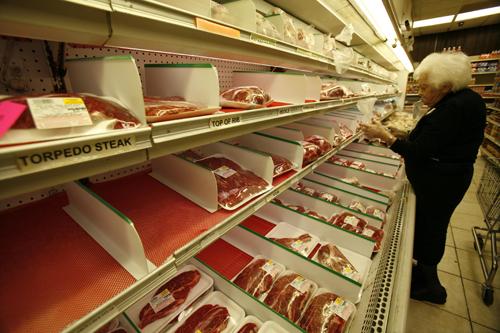Customers stew as kosher meat gets scarce

Wilfredo Lee, The Associated Press
December 2, 2008
MIAMI – Rabbi Moishe Silverman stood taking inventory of a meat freezer at South Florida Kosher, the supermarket and butcher shop where he works. Dressed in a yarmulke and tie and wearing a plastic apron over his white butcher jacket, he surveyed the piled boxes of chicken and beef.
“Normally, this, on a Monday, this would be stacked up to here,” he said, pointing to a mark on the wall above his head.
But the cardboard boxes of beef in the freezer mostly reached his knee. It’s a scene being repeated in the freezers of kosher butchers and their customers across the nation.
The shortage is the result of the collapse of Agriprocessors Inc., formerly the largest kosher meatpacking company in the nation. In May, nearly 400 workers were arrested in an immigration raid at the company’s Postville, Iowa, slaughterhouse.
Since then, the company has struggled, and the plant has closed, leaving a hole in the $12.5 billion-a-year U.S. kosher food market. Agriprocessors stopped shipping beef about three weeks ago and chicken in the last week, customers said. Since there are only a handful of processors nationwide who slaughter animals according to Jewish law and under the supervision of rabbis, the shutdown has cut the kosher meat supply to the bone.
Get The Daily Illini in your inbox!
Other processors have been swamped with orders, increasing the amount of meat they produce or refusing to take new clients. Some consumers are paying up to 40 percent more for the same meat. Markets and butchers say they can’t get certain cuts of beef for their customers, largely Orthodox Jews, and some have had to rearrange what they do have to fill display shelves.
“We just spread out the stuff that we do have so it shouldn’t look empty, but there’s no question there are cuts that are missing,” said Yitzie Spalter, the manager of the North Miami Beach store where Silverman works.
Previously, 80 percent of the store’s meat came from Agriprocessors, Spalter said. Now, he hasn’t been able to get it in the same quantities. On an average Sunday, the store would get 250 cases of meat. On a recent Sunday, the store received just 26 and a promise of 120 more during the week – still just over half their normal order.
And they’ve been lucky.
Spalter fields calls from restaurants and caterers who can’t get meat at all. He tries to supply them, but his customers come first. Shoppers said his store did have more of a selection than others.
Smaller communities, where Agriprocessors had a niche market, may be among the hardest hit, but big cities are not immune. Markets in Miami, Cleveland, Arizona and Houston relied on the company, said Menachem Lubinsky, the editor of industry newsletter KosherToday.com and a former Agriprocessors spokesman.
“We’re buying from anybody we can get it from,” said Darryl Ames, the store manager at independent grocery store Belden’s in Houston. “We may not have veal or we may not have a certain type of roast, but usually within a few days we get it back in stock.”
Heshy Wilensky, the owner of New Deal Kosher Market in North Miami Beach, said he stopped doing business with Agriprocessors in June, shortly after the raid, because he didn’t like what he was reading about the company. Previously, 90 percent of his meat had come from the company, but he said he wasn’t having trouble getting kosher meat.
The shutdown has been less of a problem in places like New York. That’s where Agriprocessors’ chief competitor, Alle Processing, is headquartered and has more of a market share. Alle Processing did not return a telephone call seeking comment.
But Murray Weltz, co-owner of Park East Kosher Butchers & Fine Foods in New York, said Agriprocessors used to supply about 50 percent of the 5,000 pounds of beef he sells on a busy week, about the weight of a Hummer H3. One recent week was bad, he said. He was short 1,000 to 1,500 pounds of meat. And kosher short ribs that cost him $12.98 per pound in May are now $16.98.
The shortage has been an opportunity for other processors, however.
Last week, New York-based Empire Kosher Poultry Inc. increased its poultry output by 50 percent, adding 100,000 chickens a week to the kosher market. Wise Kosher Natural Poultry Inc., which processes kosher beef at a South Dakota plant, was also turning out more as were other smaller processors like Dallas-based A.D. Rosenblatt Kosher Meats.
A few weeks ago, A.D. Rosenblatt started making meat five days a week instead of three to keep up with demand from distributors, said chief operating officer and owner Yaakov Rosenblatt. He’s hired more rabbis to slaughter and inspect his beef.
“If it’s red and it’s meat then it sells,” Rosenblatt said.
Customers, meanwhile, are stuck. They are buying what they can and waiting to see what will happen. Chanie Schapiro said her usual meat store in Florida has not had much of a selection the past few months, not even ground meat, though chicken is easier to come by than beef.
“I can’t buy steak. I can’t buy roast,” Schapiro said. “I’m stuck with chicken, and chicken.”






